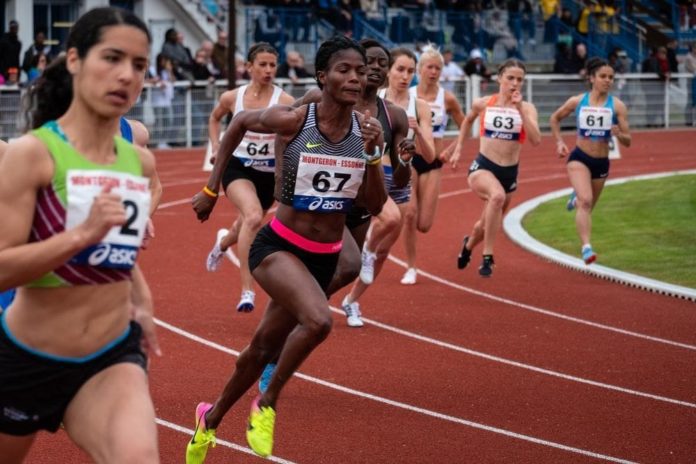Namibian teenage athletic duo of Christine Mboma and Beatrice Masilingi took the athletic world by storm when they ran the year’s fastest times in the 400m race. However, the IAAF and World Athletics expunged the race records because they had higher levels of testosterone.
Testosterone is a determinant of red blood counts, and a high concentration of this gland results in higher red blood cells and increased oxygen flow to the muscles – giving them more energy to run with. Ironically, neither of the girls was tested before this announcement. Eventually, the ban was reduced to the 400m race and a mile races, making her only able to run the 100m and 200m races.
That exclusion seems to have become a blessing in disguise as all she has done is excel. A month after the ban was pronounced, Mboma qualified for the 200M Olympic final and finished second. Winning the silver medal was an incredible achievement for the 18-year-old who says she is undeterred and willing to fight the ban. Mboma lost to Thompson-Herah, who emerged champion in both the 100M and 200M events.
Read on as sports analyst Kate Richardson of Mightytips.com answers some questions surrounding the track intricacies of Christine Mboma’s rise to the top.
1. Why Was She Banned?
When news of the ban got to Mboma, she was getting off a plane alongside her coach. Basilingi, on the other hand, read the news on social media. The duo caught the eyes of World Athletics’ eyes as they had run four of the five fastest times in the women’s 400M. The Athletic governing body ran tests, and it showed that both women had differences in sexual development. This naturally occurring condition causes their bodies to produce more testosterone than the average female.
World Athletic regulations require women participating in international 400M to mile race events to return lower testosterone levels than their male counterparts. Women who test positive for increased testosterone levels are required to take testosterone reducing medication. Mboma had clocked 48.54 sec in the 400 meters race, the fastest time in the world this year and seventh overall in women’s 400m races.
2. Can She Still Compete?
These regulations only apply to international races of 400 meters and above, leaving the athletes free to compete locally. Athletes also have the option of competing in the 200m event, which is free from testosterone regulation. It is the latter option which Christine Mboma and her teammate have chosen.
3. How Has She Fared In The 200m?
For a woman who majorly competed in the 400m and 800m events, being restricted to the 200m events can be stressful and frustrating. However, the 18-year-old Namibian is the fastest woman in her nation and recently posted the fastest time in the 200m event for a woman below 20 years of age.
Mboma won the Olympic Silver medal last month at Tokyo 2021, with a personal best of 21.81 seconds, the current world record for under 20 women. Mboma’s debut at the Diamond League saw her win the race at 21.84 seconds, beating current world champion Dina Asher-Smith, Shericka Jackson and Sha’Carri Richardson in a similar yet stellar fashion to the finish line. Her teammate Basilingi was some way off in fourth place.
4. Mboma’s Reaction
While Basilingi has been quite vocal in her criticism of the ban, Mboma has been much more conservative, refusing to state her true feelings on the subject. After winning the 200 metre Diamond League race in Brussels, she sidestepped reporters’ questions, saying, “I just keep my head down and concentrate on the 200 meters. Now, I got a medal. Happy.”
She also called the race the best of her life and mentioned the willingness to take on the 100m challenge. Eventually, a reporter got her to state whether or not she believed she could have won a gold medal in the Olympic 400 metre race – to which she said yes.
5. How the World Has Reacted
Mboma’s situation is reminiscent of South African sprinter Caster Semenya, who equally tested positive for elevated testosterone levels. While many question the discriminatory and unnerving requirement of hormone-altering medications, others like World Athletics deem the rules “fair, necessary and proportionate” for women of similar muscle mass, oxygen carriage and strength to compete against one another.
Doctors and women rights activists are divided on the issue, citing the difference in sexual classification of Semenya and Mboma. The World Medical Association, for instance, says the rule is based on insufficient evidence of a physical advantage in women with naturally occurring elevated testosterone levels. The hormone-altering and side effects of the drugs have also drawn criticism from athletes and fans worldwide.
While many have questioned the effectiveness of the ban given Mboma’s medal-winning performances, World Athletics spokesperson Jackie Broyle-Doyle mentions that the advantages of elevated testosterone levels are felt in longer distance races. She also stated that the rules are based on ten years of evidence, with the World Athletics willing to make necessary changes “if we see significant advances in anything that looks as if the playing field is no longer fair.”
Conclusion
The off-track drama has not hindered the athlete’s performance or the influx of sponsorship deals. Mboma now has a sponsorship agreement with Nike, which sees them supply her training kit, travels, and jerseys. Mboma’s teammate, Basilingi, is also signed to Adidas, which will make them more appealing to punters big on bet with highest odds.
As the world awaits what is yet to come of Mboma’s running abilities, the teenager has expressed a desire to one day compete in the 100 metres. The young teenage girl from Namibia is unrelenting in showing the world her talent and is riding the wave to success.
















